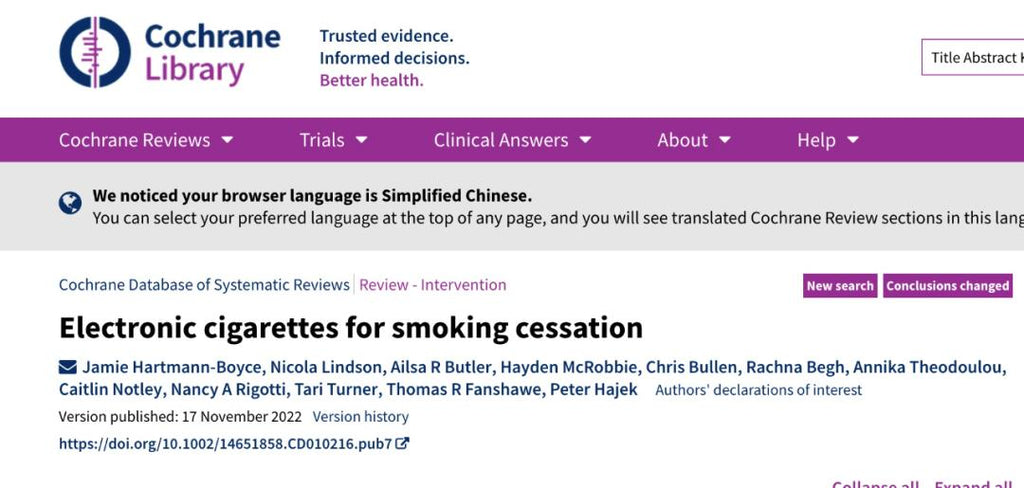An update from 17 new studies provides more evidence that disposable vape are a more effective smoking cessation tool than traditional nicotine replacement therapy (NRT), Oxford researchers found Twice that of other smokers.
Cochrane summarizes and interprets scientific and medical research to produce reviews and meta-analyses on key scientific questions that are considered the gold standard in medicine. The review aimed to examine the effectiveness, tolerability and safety of e-cigarettes for helping people quit smoking and included 78 studies representing 22,052 participants. Forty of these studies were randomized controlled trials.
The main findings and conclusions of the Cochrane Review are summarized below:
There is high-certainty evidence that nicotine-containing e-cigarettes increase smokers' chances of achieving long-term abstinence compared with conventional nicotine replacement therapy.

Evidence also suggests that nicotine e-cigarettes may be more helpful for people trying to quit smoking than behavioral support, although researchers are less certain.
In addition, in a very important finding, the researchers found no evidence of serious harm from e-cigarettes.
Cochrane findings clearly show that e-cigarettes can play a key role in the transition of generations of smokers to reduced-risk nicotine products. Flavored products not discussed by Cochrane were shown to increase the likelihood of achieving complete smoking cessation by 43% compared with use of unflavored or tobacco-flavored e-cigarette products.
As evidence mounts in favor of vaping, it becomes more important for lawmakers to stand with their vaping constituents against anti-science restrictions.
Cancer experts welcomed the report, which added to growing evidence that e-cigarettes are effective smoking cessation tools.
Dr Jamie Hartmann-Boyce, lead author of the article, said: "E-cigarettes have caused a lot of misunderstanding in the public health community and popular media since their introduction more than a decade ago.
"For the first time, this provides us with high-certainty evidence that e-cigarettes are more effective in helping people quit smoking than traditional nicotine replacement therapies such as patches or gum."
Cancer Research UK chief executive Michelle Mitchell said:
We welcome this report, which adds to the growing body of evidence that e-cigarettes are an effective smoking cessation tool.

While the long-term effects of vaping are still unknown, the harmful effects of smoking are indisputable - smoking causes around 55,000 cancer deaths in the UK every year.
Cancer Research UK supports the UK Government's balanced evidence-based regulation of e-cigarettes, maximizing their potential to help people quit smoking while minimizing the risks of vaping.
The researchers concluded that more evidence is needed to help more people quit smoking, especially evidence that newer e-cigarettes deliver better nicotine than earlier e-cigarettes.
Longer-term data are needed, they said.
Independent experts said the results should reassure smokers that e-cigarettes can help them quit.
Lead researcher Dr Sarah Jackson from the UCL Tobacco and Alcohol Research Group said:
E-cigarettes are popular among smokers trying to quit, with one in every three quit attempts in the UK involving vaping.
A growing number of trials are testing whether e-cigarettes make it easier for smokers to successfully quit. This review provides the most rigorous and up-to-date summary of this evidence.
With more data available than ever before, the authors conclude that there is now high-quality evidence that e-cigarettes are more effective than traditional nicotine replacement therapies such as nicotine patches and gum in helping people quit smoking.
These findings follow a recent review of the dangers of vaping, which showed clear evidence that vaping poses only a fraction of the health risks of smoking.
Overall, these reports should reassure smokers that e-cigarettes are safer to use and may increase their chances of quitting.

